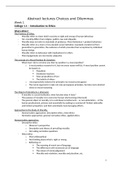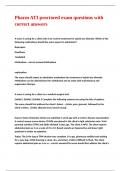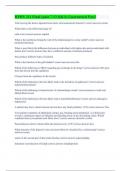Abstract lectures Choices and Dilemmas
Week 1
College 1.1 – Introduction to Ethics
What is Ethics?
The Province of Ethics
- Morality refers to views held in society on right and wrong of human behaviour
- Yet, morality differs from religion, politics, law and etiquette
- Morality does not refer to standards of prudence. Moral behaviour ≠ prudent behaviour
- Morality refers to a more or less durable social institution: standards transferred from
generation to generation, the existence of which precedes their acceptance by individual
human beings
- Morality refers to behaviour with implications for others
- Moral judgements are not merely subjective
The concept of a Moral Position (R. Dworkin)
- What must I do to convince you that my position is a moral position?
o Is must produce reasons for it, but not every reason will do. A moral position cannot
be based on:
Prejudices
Emotional reactions
False propositions of fact
The beliefs of others
o I must genuinely endorse the principles my reasons presuppose
o The moral arguments I make not only presuppose principles, but also more abstract
views on moral reasoning
The Object of Morality (G.J. Warnock)
- If morality is a social institution, what function does it have?
- The purpose of morality is to overcome human shortcomings (Warnock)
- The general object of morality is to contribute to betterment – or non-deteriation – of the
human predicament, primary and essentially by seeking to countervail ‘limited rationality
and limited sympathies’ and their potentially most damaging effects
Approaches to the Study of Morality
- Nonnormative approaches: descriptive ethics, meta-ethics
- Normative approaches: general normative ethics, applied ethics
Nonnormative approaches
- Descriptive ethics
o Observer’s perspective
o Description and theory of prevailing morality
o Not asking normative questions
- Meta-ethics
o More philosophical
o Not thinking about what is right or wrong
o Reflecting on
The meaning of moral use of language
The differences with nonmoral use of language
The nature of moral judgement
Morality and relativism, morality and pluralism, etc.
1
,Normative approaches
- General normative ethics
o Participant’s perspective
o Systematic-philosophical reflection on prevailing morality
Utilitarianism
Deontology
Virtue ethics
- Applied ethics
o Ethics applied to a certain domain
o Medical ethics, bioethics, etc.
Relativism and Pluralism
- Morality and relativism (R. Brandt)
o Types of relativism
Cultural relativism; what?
Different moral judgements between cultures
Criticism
o Relativism with regard to moral judgements
o Relativism with regard to underlying moral standards
Normal relativism
Criticism
You must accept certain differences in moral norms between
cultures
- Morality and pluralism (A. MacIntyre)
o Pluralism Differences in moral judgement
This is a fact of life that there are differences
o Moral disagreement: what?
Can be overcome
What to do?
Objective factual information
Unambiguous terminology
o Be clear about the meaning of the words you use
Acceptance of common framework of moral norms
Use of (counter)examples
Analysis of arguments (logic)
Justification
- Assuming that it will not do to simply claim that something is right because we believe it to
be right, would it – then – be possible to justify moral judgements? In other words, how can
we show that something is morally right?
o Is it possible to refer to an independent standard?
Internal justification
External justification
- can we justify that we ought to be good human beings? Can we justify that we ought to live
moral lives? In other words, why be moral?
o Is living a moral life a reasoned choice? Is morality in the end a matter of reasons and
reasonableness or rationality?
o If living a moral life is not a reasoned choice, is morality – then – a matter of desire
and beliefs, of feeling?
If living moral life is a reasoned choice, could we – then – speak of
Moral knowledge?
Moral truth?
2
,Knowledge and Truth in Morality
- Cognitivism
o Naturalism
o Intuitionism
- Noncognitivism
o Emotivism
o Prescriptivism
- Reflective equilibrium
o A moral judgement about the right or wrong of a practice can be true, but only if it is
coherent with all other moral beliefs
The Ethical Perspective
1. A moral problem is a normative problem
2. No appeal is made to authority of dogma to come to a moral judgement
a. No judgement is based on something a authority has said in the past
3. Moral judgements should be based on good arguments exclusively
4. The points of view of all concerned are taken into account
Moral norms
- Common morality = universal morality
o People committed to morality, grasp the fundamental norms of morality, although
there may be differences of opinion regarding their precise meaning, scope, weight,
etc.
o Fundamental norms apply to all human beings in all circumstances
o Common morality is the product of human experience and history, shared by all
o No place for relativism and pluralism on the level of the fundamental norms
o Common morality encompasses moral convictions, not the standards preceding
those convictions
o Theories of common morality are historical products
- Particular morality ≠ universal morality
o Many norms do not apply to all human beings in all circumstances. These norms are
not vague and abstract, but specific and rich in content
o Particular moralities share fundamental norms with other particular moralities, but
not their specific norms
o Particular moralities provide for responsibilities, professional standards, etc.
o Types of particular morality:
i.a. professional moralities, medical professional morality
Moral norms
- Moral dilemmas:
o What?
o No practical dilemmas
o Not merely a technical dilemma
o A real dilemma is created by norms which really point to different directions
- A common framework of moral norms
o Principles
Respect for autonomy
Non-maleficence
Beneficience
Justice
Principlism in biomedical ethics
o Rules
3
, Substantive norms
Authority norms
Procedural norms
o Virtue, emotions, etc.
Moral Character
- Do virtues offer guidance?
- Moral ideals?
o What?
o Supererogatory acts
o Continuum of obligations
o Ideals in biomedical ethics
- Moral excellence
Again, Moral Norms
- Conflicting moral norms
o Prima facie obligations
Result in a dilemma
o Actual obligations
The obligation you feel, once you have reasoned, what you should do in the
end
In the health care this is all laid out
- Specifying principles and rules
- Weighing and balancing
4
Week 1
College 1.1 – Introduction to Ethics
What is Ethics?
The Province of Ethics
- Morality refers to views held in society on right and wrong of human behaviour
- Yet, morality differs from religion, politics, law and etiquette
- Morality does not refer to standards of prudence. Moral behaviour ≠ prudent behaviour
- Morality refers to a more or less durable social institution: standards transferred from
generation to generation, the existence of which precedes their acceptance by individual
human beings
- Morality refers to behaviour with implications for others
- Moral judgements are not merely subjective
The concept of a Moral Position (R. Dworkin)
- What must I do to convince you that my position is a moral position?
o Is must produce reasons for it, but not every reason will do. A moral position cannot
be based on:
Prejudices
Emotional reactions
False propositions of fact
The beliefs of others
o I must genuinely endorse the principles my reasons presuppose
o The moral arguments I make not only presuppose principles, but also more abstract
views on moral reasoning
The Object of Morality (G.J. Warnock)
- If morality is a social institution, what function does it have?
- The purpose of morality is to overcome human shortcomings (Warnock)
- The general object of morality is to contribute to betterment – or non-deteriation – of the
human predicament, primary and essentially by seeking to countervail ‘limited rationality
and limited sympathies’ and their potentially most damaging effects
Approaches to the Study of Morality
- Nonnormative approaches: descriptive ethics, meta-ethics
- Normative approaches: general normative ethics, applied ethics
Nonnormative approaches
- Descriptive ethics
o Observer’s perspective
o Description and theory of prevailing morality
o Not asking normative questions
- Meta-ethics
o More philosophical
o Not thinking about what is right or wrong
o Reflecting on
The meaning of moral use of language
The differences with nonmoral use of language
The nature of moral judgement
Morality and relativism, morality and pluralism, etc.
1
,Normative approaches
- General normative ethics
o Participant’s perspective
o Systematic-philosophical reflection on prevailing morality
Utilitarianism
Deontology
Virtue ethics
- Applied ethics
o Ethics applied to a certain domain
o Medical ethics, bioethics, etc.
Relativism and Pluralism
- Morality and relativism (R. Brandt)
o Types of relativism
Cultural relativism; what?
Different moral judgements between cultures
Criticism
o Relativism with regard to moral judgements
o Relativism with regard to underlying moral standards
Normal relativism
Criticism
You must accept certain differences in moral norms between
cultures
- Morality and pluralism (A. MacIntyre)
o Pluralism Differences in moral judgement
This is a fact of life that there are differences
o Moral disagreement: what?
Can be overcome
What to do?
Objective factual information
Unambiguous terminology
o Be clear about the meaning of the words you use
Acceptance of common framework of moral norms
Use of (counter)examples
Analysis of arguments (logic)
Justification
- Assuming that it will not do to simply claim that something is right because we believe it to
be right, would it – then – be possible to justify moral judgements? In other words, how can
we show that something is morally right?
o Is it possible to refer to an independent standard?
Internal justification
External justification
- can we justify that we ought to be good human beings? Can we justify that we ought to live
moral lives? In other words, why be moral?
o Is living a moral life a reasoned choice? Is morality in the end a matter of reasons and
reasonableness or rationality?
o If living a moral life is not a reasoned choice, is morality – then – a matter of desire
and beliefs, of feeling?
If living moral life is a reasoned choice, could we – then – speak of
Moral knowledge?
Moral truth?
2
,Knowledge and Truth in Morality
- Cognitivism
o Naturalism
o Intuitionism
- Noncognitivism
o Emotivism
o Prescriptivism
- Reflective equilibrium
o A moral judgement about the right or wrong of a practice can be true, but only if it is
coherent with all other moral beliefs
The Ethical Perspective
1. A moral problem is a normative problem
2. No appeal is made to authority of dogma to come to a moral judgement
a. No judgement is based on something a authority has said in the past
3. Moral judgements should be based on good arguments exclusively
4. The points of view of all concerned are taken into account
Moral norms
- Common morality = universal morality
o People committed to morality, grasp the fundamental norms of morality, although
there may be differences of opinion regarding their precise meaning, scope, weight,
etc.
o Fundamental norms apply to all human beings in all circumstances
o Common morality is the product of human experience and history, shared by all
o No place for relativism and pluralism on the level of the fundamental norms
o Common morality encompasses moral convictions, not the standards preceding
those convictions
o Theories of common morality are historical products
- Particular morality ≠ universal morality
o Many norms do not apply to all human beings in all circumstances. These norms are
not vague and abstract, but specific and rich in content
o Particular moralities share fundamental norms with other particular moralities, but
not their specific norms
o Particular moralities provide for responsibilities, professional standards, etc.
o Types of particular morality:
i.a. professional moralities, medical professional morality
Moral norms
- Moral dilemmas:
o What?
o No practical dilemmas
o Not merely a technical dilemma
o A real dilemma is created by norms which really point to different directions
- A common framework of moral norms
o Principles
Respect for autonomy
Non-maleficence
Beneficience
Justice
Principlism in biomedical ethics
o Rules
3
, Substantive norms
Authority norms
Procedural norms
o Virtue, emotions, etc.
Moral Character
- Do virtues offer guidance?
- Moral ideals?
o What?
o Supererogatory acts
o Continuum of obligations
o Ideals in biomedical ethics
- Moral excellence
Again, Moral Norms
- Conflicting moral norms
o Prima facie obligations
Result in a dilemma
o Actual obligations
The obligation you feel, once you have reasoned, what you should do in the
end
In the health care this is all laid out
- Specifying principles and rules
- Weighing and balancing
4




